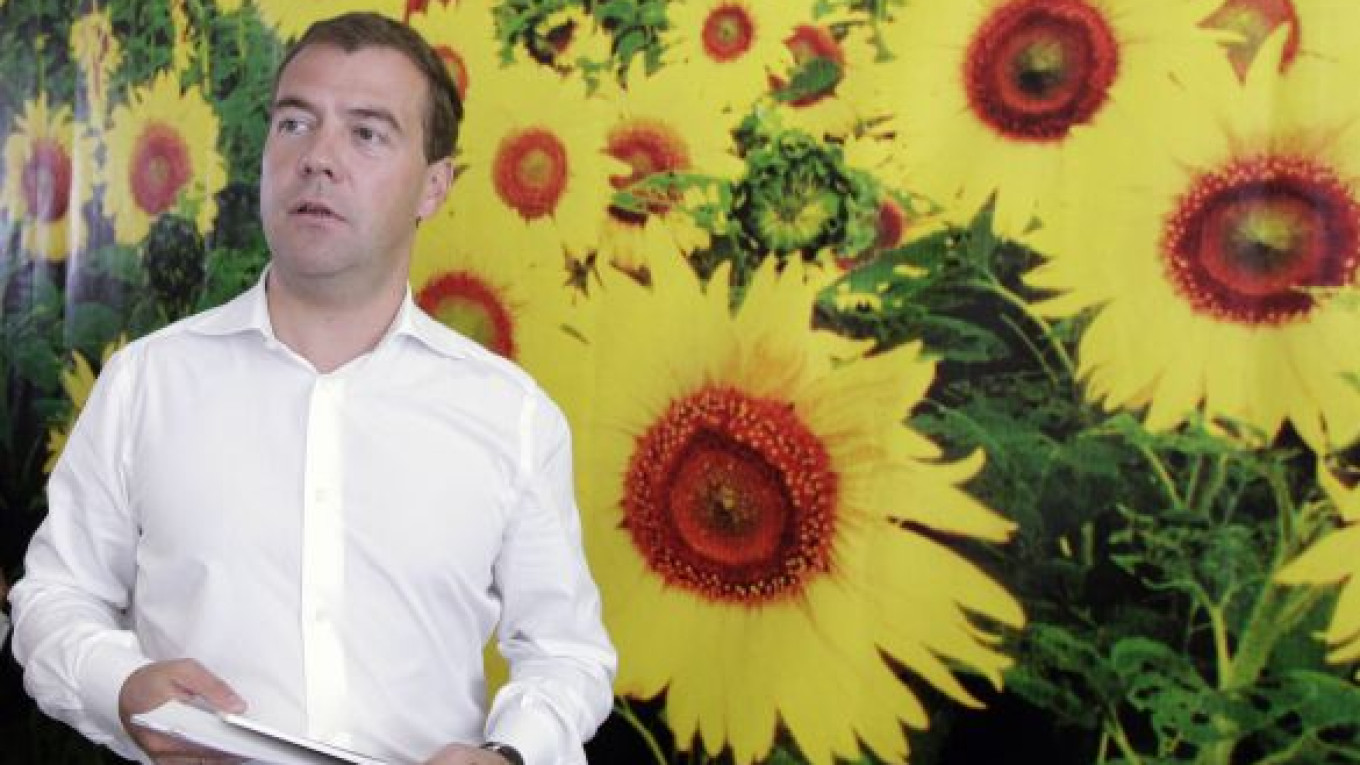President Dmitry Medvedev said Thursday that a severe drought has slashed the country's grain crop by a quarter and ordered the government to prevent a rapid growth in food prices.
Some supermarkets said suppliers of basic foodstuffs like bread and milk have already hiked prices by as much as 30 percent, but analysts predicted that government intervention would bring the prices back down.
"The situation is very complicated because about a fourth of the grain crop has burned in the country," Medvedev told a meeting devoted to the issue in the city of Taganrog in the Rostov region, where he visited a sun-scorched grain field.
"Unfortunately, many farmlands are about to file for bankruptcy because of the ruined crops," Medvedev said.
The official estimate for the area sown for this year's grain crop is 43.6 million hectares.
The president warned that some food suppliers were trying to profit from the drought and ordered the government and the Prosecutor General's Office to track the prices of grain, bread, meat and milk to prevent sharp increases.
He said it was the government's "direct responsibility" to prevent prices for basic foodstuffs from rising.
"We should understand that this is the most sensitive category of products," he said, adding that the situation in the agricultural sector largely depended on the prices for basic foodstuffs.
The Prosecutor General's Office ordered regional prosecutors and the Federal Anti-Monopoly Service to prevent price collusion after an investigation found that some retail and wholesale grain suppliers had increased prices, a spokeswoman said.
Mayor Yury Luzhkov also asked the Federal Anti-Monopoly Service to investigate bread producers that increased prices, City Hall said in an e-mailed statement.
Sedmoi Kontinent, a supermarket chain, announced Thursday that it had suspended work with Danone and Unimilk after the two dairy producers raised milk prices by 31 percent.
Some suppliers started hiking prices for basic foodstuffs earlier this month, saying they had to take current market conditions into account, said Vlada Baranova, a spokeswoman for Sedmoi Kontinent.
"Everything started with the increase of milk prices — the most significant increase in this category — then came buckwheat and groats, followed by bread," Baranova told The Moscow Times.
She said bread prices have soared by 25 percent since the beginning of the month, while butter prices have risen by 20 percent.
The supermarket, however, is trying to keep retail prices unchanged and is negotiating with suppliers while restocking store shelves with warehoused goods purchased at the old prices, she said.
The jump in milk and bread prices looks more like the result of suppliers using the drought as an excuse to raise prices rather than the fact that domestic and world grain prices are increasing, in part because of Russia's drought, said Igor Vasilyev, head of Zerno Online, an industry information agency.
"The increase in prices for bread and bakery goods is baseless because just 25 percent of the price of bread is linked to grain costs," he said.
Medvedev also said there was no foundation for bread prices to increase this year.
Thanks to government intervention, however, prices for basic foodstuffs are unlikely to see large increases despite weather-related pressure on the market, said Maxim Klyagin, consumer market analyst at Finam Management. He said government measures to support farmers would also likely play a role in keeping prices stable.
The government plans to allot as much as 35 billion rubles (just over $1 billion) to support farmers who had seen most of their crops scorched.
The Agriculture Ministry said Thursday that a reduced grain harvest of 60 million to 65 million metric tons is expected in 2010 and 2011, and only 2 million to 4.5 million metric tons of it might be exported.
Russia exported 1.6 million metric tons of grain last month and may export another 1.2 million metric tons by Saturday, when an export ban announced by Prime Minister Vladimir Putin last week goes into effect.
Russia also might increase grain imports to 2.5 million to 3 million metric tons in the marketing year starting July 1, compared with 600,000 metric tons a year earlier, the Agriculture Ministry said, Interfax reported.
Meanwhile, meteorologists said the drought was unlikely to ease before the end of August, which might hamper the sowing of winter crops.
A number of regions might skip winter grain sowing if no rain falls by Sept. 5, Agriculture Minister Yelena Skrynnik said Wednesday.
A key month for sowing winter grain is September, and there is a risk that the amount of winter grain that is sown might be cut, although some farmers may sow hoping that rain will come sometime soon, Vasilyev said.
"If we really look at the climate conditions that are being forecast now, then I am quite sure Russia will face problems in 2011, and that will boost world prices," he said.
A Message from The Moscow Times:
Dear readers,
We are facing unprecedented challenges. Russia's Prosecutor General's Office has designated The Moscow Times as an "undesirable" organization, criminalizing our work and putting our staff at risk of prosecution. This follows our earlier unjust labeling as a "foreign agent."
These actions are direct attempts to silence independent journalism in Russia. The authorities claim our work "discredits the decisions of the Russian leadership." We see things differently: we strive to provide accurate, unbiased reporting on Russia.
We, the journalists of The Moscow Times, refuse to be silenced. But to continue our work, we need your help.
Your support, no matter how small, makes a world of difference. If you can, please support us monthly starting from just $2. It's quick to set up, and every contribution makes a significant impact.
By supporting The Moscow Times, you're defending open, independent journalism in the face of repression. Thank you for standing with us.
Remind me later.


